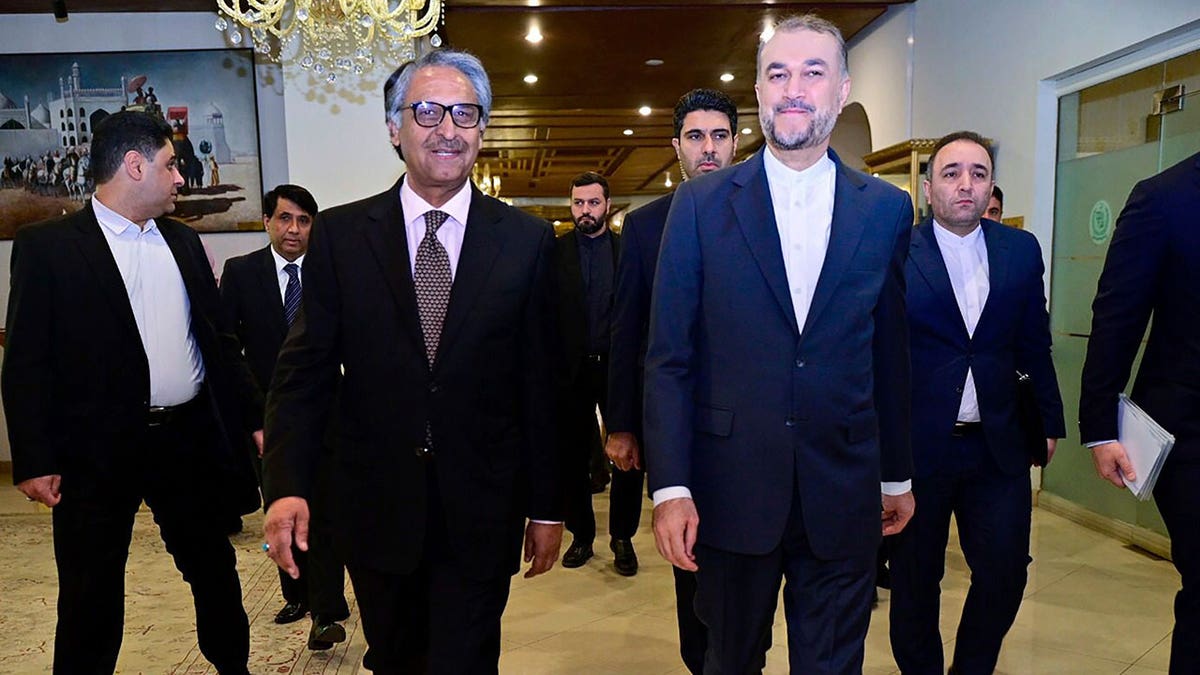Iranians are looking for weakness: Chuck Nash
Fox News anchor Arthel Neville speaks with Ret. U.S. Navy Capt. Chuck Nash about a drone attack that killed three U.S. troops in Jordan on 'Fox News Live.'
- Pakistan and Iran have agreed to enhance security cooperation following deadly airstrikes by both countries earlier this month.
- The airstrikes, initiated by Iran in Baluchistan province targeting Jaish al-Adl, led to multiple casualties, escalating tensions.
- Pakistan retaliated with airstrikes in Iran's Sistan and Baluchestan province, targeting Baluch militant groups.
Pakistan and Iran on Monday agreed to work together to improve security cooperation in the wake of deadly airstrikes by Tehran and Islamabad earlier this month that killed at least 11 people, marking a significant escalation in fraught relations between the neighbors.
The development came after the top Iranian diplomat, Hossein Amirabdollahian, held talks in Islamabad with his Pakistani counterpart, Jalil Abbas Jilani. The Iranian foreign minister also met with Pakistan’s caretaker Prime Minister Anwaarul-Haq-Kakar.
Iran-Pakistan ties were dramatically imperiled on Jan. 17, when Iran launched airstrikes in Pakistan’s restive southwestern Baluchistan province, targeting what Tehran said were hideouts of the anti-Iran Sunni militant group Jaish al-Adl, or the Army of Justice. Pakistan said two children were killed and tree others were wounded.
PAKISTAN CONDUCTS RETALIATORY MILITARY STRIKES AGAINST PAKISTANI TERRORISTS OPERATING IN IRAN
Angered over the strikes, Pakistan recalled its ambassadors from Tehran and launched airstrikes against alleged militant hideouts inside Iran, in the Sistan and Baluchestan province, killing at least nine people. Islamabad said it was targeting Baluch militant groups with separatist goals.

Iran's Foreign Minister Hossein Amirabdollahian, right, walks with his Pakistani counterpart Jalil Abbas Jilani upon his arrival for a meeting at the Ministry of Foreign Affairs in Islamabad, Pakistan, on Jan. 29, 2024. Pakistan and Iran have agreed to work together to improve security cooperation in the wake of deadly airstrikes by Tehran and Islamabad earlier this month. (Ministry of Foreign Affairs via AP)
At a joint news conference later Monday, Amirabdollahian and Jilani said they would work through existing channels in their leadership, diplomatic and military levels to cooperate with each other.
Jilani said the two countries were able to bring the "situation back to normal in the shortest possible time" after the airstrikes because both sides had agreed to resume dialogue to resolve all issues.
"Terrorism poses a common challenge to our countries," Jilani said and stressed that "respect for sovereignty and territorial integrity remains the immutable and foundational principle of this cooperation" between the neighbors.
He announced regular future meetings at top ministerial levels and also between liaison officers.
Iran and Pakistan "strongly respect sovereignty and territorial integrity of each other," Amirabdollahian. "We will tell all terrorists that we will not ... provide them with any opportunity to endanger our common security."
Amirabdollahian said Pakistan and Iran will also set up free trade economic zones near the border regions to enhance their bilateral trade.
PAKISTAN WARNS OF 'CONSEQUENCES' AFTER IRAN'S DEADLY BOMBING KILLED TWO CHILDREN
Iran and nuclear-armed Pakistan have long regarded each other with suspicion over militant attacks on their sides of the border. Experts say the tit-for-tat strikes this month were at least partially prompted by internal political pressures though they also raised the threat of violence spreading across the Middle East, already unsettled by Israel’s war with Hamas in Gaza.
During his visit, Amirabdollahian was also expecting to brief his hosts about an incident Saturday in which unknown gunmen shot and killed at least four Pakistani laborers and wounded three others in Iran’s Sistan and Baluchestan province. Pakistan has condemned the killings, describing the attack as "horrifying and despicable".
Relatives of the slain Pakistanis rallied on Sunday, demanding that the bodies of their loved ones be brought home. Pakistan said arrangements were being made for that with Iran's help and that the three wounded workers were being treated at an Iranian hospital.








































